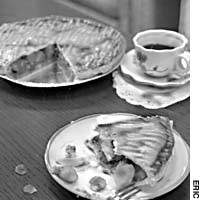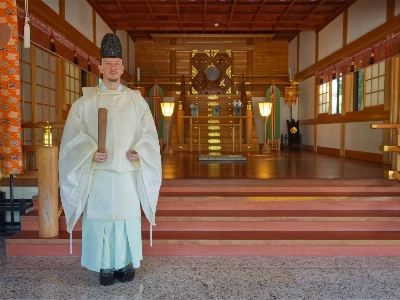She hung up the phone and looked out of the living-room window. The house was on a slight rise and she could see most of Fairview Estates -- the rows of wide, orderly streets, the big houses and neat lawns, children on bicycles, the mail truck making its rounds. It all looked too neat, too much like a movie set, like the opening of "Father Knows Best" or one of the other American TV series she had seen in Japan as a child.
She was just acting a part; none of this was real.
It was usually little things that touched off that feeling: the voice of the delivery boy as he said, "Have a nice day!" Or the sensation on her palm as the girl at the cash register in the supermarket dropped all those strange coins into her hand. Sometimes, something seemed to be mocking all the fragile habits of seeing and feeling and doing that had begun to make this place almost familiar after nearly a year.
This time it was the "problem" at the other end of the phone line -- a call from Detective Bob Standish. There was a problem and he wanted to talk to her and her husband.
"What is the problem?" she had asked.
They all used that word so often. Problem. No problem. Do you have a problem with that? You have an attitude problem. It's not my problem.
"It's probably nothing, really, but I'd rather not talk about it over the phone. What time will Mr. YamaSHEta get home?" They all said Yama-SHE-ta, not YAMAsh'ta. She had stopped correcting their accents long ago. This was America. They all did it here.
"He's out of town for business. He won't come back until Saturday."
"I see. Well, we'd like to clear this up as soon as possible. Is it OK if I come by your home sometime this afternoon?"
"Yes, I'll be here all day."
Will 4 o' clock be OK?"
"Yes, that will be OK."
He said it was "probably nothing, really." But he didn't want to talk about it on the phone, so it must probably be really something. Her son Kenji was only 10. She had seen children his age on TV, 10-year-old boys with pink hair and earrings, carrying guns and taking drugs. But not her son Kenji, not here in Fairview. The company had said Fairview was a safe place, and Kenji went to the Japanese school for children of company employees. Daughter Noriko was only 5, and a good, quiet little girl, so surely there couldn't be any problem there either.
Mrs. Yamashita tried to forget about the "problem" as she spent the day cleaning the enormous house and playing with Noriko, but it kept coming back. What could it be? She had been careful to separate the garbage into burnable and unburnable. Parking tickets? Do they send the police for overdue library books?
She made some iced tea for herself and Detective Bob Standish, who arrived just after 4. "Please come in," she said, and noticed how he stopped to look at the flowers arranged on a table near the door, the pairs of shoes in a neat row at one side of the entrance hall and the row of slippers on the other side. "It's just a custom," she said.
"Pardon?"
"We put on slippers to walk in the house, but feel free to wear your shoes."
"Thanks," said Standish, and followed her into the living room. After they had sat down and she had poured them both some iced tea, she told him how much they were enjoying life in Fairview.
"We're happy to have you here," he said. "The new factory has meant a lot of jobs for people in this town."
"The company is very happy with the situation here. Americans work very hard. But you said there was a problem? It's not about my son, Kenji, is it?"
"Your son? No. It's this." He reached into his inside jacket pocket, pulled out an envelope and placed it on the coffee table. "It's these photographs. They are yours, aren't they?"
Mrs. Yamashita took the photos from the envelope and began to look at them. "Yes. This is the company barbecue. That's me and my husband Yasuo and the children. And Yasuo took these after Kenji's Little League game."
"When did you take these photos in to be developed?"
"Last Monday, I think. I know it's an overnight service, but I was too busy. I was going to get them tomorrow."
"Well, the man at the shop called us about these last two pictures. We've had a problem recently with certain kinds of photos, and he was naturally concerned."
"Concerned?"
"Yes. Did you take them?"
"You mean these of my husband and daughter? Yes. There were two more pictures left in the camera."
"I guess you can understand the problem."
"Is there a problem?"
"Well, I'm sure there's a simple explanation but . . . a grown man and a young child, a girl . . . " "They're taking a bath."
"Yes, well . . . "
"Really, it's the tub, the wide American bathtub. It looks like a tub at a hot-spring resort in Japan."
He smiled. "Does it? I'm sorry, but I've never been to Japan."
"Yes, it does. We have such a small bathroom at home in Tokyo. I wanted to show my relatives in Japan our huge American bathroom."
"Yes, but it's just that we've had problems with pictures of adults and children in this kind of situation."
"Problems? Is there a situation? It's a . . . " she fumbled for the word. "It's skinship."
"Pardon me . . . kinship? You mean they're related to each other?" he asked.
"Yes, of course. They are father and daughter. They're taking a bath. But I said 'skinship.' It's skinship." She was sure she had got it right this time. She smiled as she looked at Detective Standish, who bent toward her, a quizzical look on his face.
"I'm sorry. I don't quite understand," he said.
"Excuse my poor English, but in Japanese, it is a . . . a kind of naked relationship, a heart-to-heart."
"A what?"
"It creates a good feeling between human beings -- parents and children, friends, company employees, all together in a hot tub. It's my husband and my daughter. They're taking a bath. Isn't she cute?" She examined his expressionless face. "It's a custom," she said and smiled again.
He smiled back. "Yes. Well, I'm sure there's a simple explanation. Perhaps I'd better talk to your husband. Could you tell him to call me when he returns. Here's my number." He gave her his card.
"He won't come back until Saturday."
"Then I'll call you again on Monday. Thanks for the tea."
"You're welcome and thank you for bringing our photos. It's so kind of you to take the trouble. I'll pay you. Wait, I'll get my purse."
"I'd like to keep these for a while, if you don't mind."
She said she didn't mind, but she didn't understand why he wanted to keep the pictures.
Her husband returned on Saturday, and after he had unpacked and settled down, she told him that a police detective had come to their house.
"Really? Why?"
"Your photos . . . "
"Photos? What photos?" he asked. "What are you talking about?"
She sensed it all in an instant. He was pretending to sound irritated, slightly angry, but he was afraid of something. He sounded like a stranger.
"The photos you took at the Little League game."
"Why would a detective come here about those?" There was still a strong, unfamiliar note of fear in his voice.
"He said there was a problem about the ones with you and Noriko in the tub."
"Is this some kind of joke?"
"I don't know what it is, but he said he would call on Monday. He wanted to talk to you."
"What else did he say?"
"Well, he kept using the words 'problem' and 'situation.' He was being so vague I had a hard time understanding, but he said the man at the photo shop was concerned about you and Noriko in the tub and that he . . . " She stopped. Photos of adults and children in a "situation." She could hardly believe what she was thinking. She began to laugh.
"Why are you laughing?" asked Yasuo. "It's the police. It's no laughing matter."
"But you and Noriko? It's crazy!"
"Well, maybe you think it's crazy but it is a serious problem here. Even back home, these things do happen."
"But it's crazy . . . She's 5 years old. You're her father. I was there taking the picture. It's crazy."
"Did you tell him that it's a custom?"
"Yes, I did, but I never thought about . . . I never imagined . . . "
"You know they can get a search warrant and come search the house."
"Why would they do that? The detective said it was probably nothing. Why are you so upset?"
"We have to be careful. We are foreigners here. Anyway, I'm sure everything will be OK. We'll talk to him on Monday."
That night Yasuo said he wasn't really tired -- jet lag or something. She went to bed, leaving him in the living room watching TV. Sometime later she was awakened by a noise in the backyard. Yasuo was not in bed. She made her way through the dark house, into the kitchen, and then to the back door. But she didn't turn on the light. She stopped, walked to the window above the kitchen sink and looked out into the backyard.
The moon was almost full and everything seemed to be covered in a silvery metallic dust. Star dust and moonlight. So beautiful. Across the patio, she could see Yasuo crouched down in front of the little incinerator they used to burn leaves in the autumn. He was feeding things into the flames. She went to the back door again, opened it, and turned on the backyard lights. In that instant, he shot a look at her. It was a face she had never seen before.
"What is it?"
"I heard a noise. What are you doing?"
"Just burning some old papers. I couldn't sleep. Thought I'd clean out my desk. Just something to do."
"Make sure you lock up," she said.
After a while, Yasuo came back in, got silently into bed, and quickly dozed off. She could not stop thinking of his face in the light. He was startled; that's all it was. She waited and waited for sleep to come.
Detective Bob Standish called on Monday and she invited him to have dessert with them that night. After dinner, she and Yasuo waited in the living room. She had made an apple pie because she knew Americans liked apple-pie. They talked about it a lot. If something was really American, they said it was like apple pie. She looked around the living room; everything was in apple-pie order. Noriko was playing in her room, and Kenji was doing his homework in Yasuo's study. The bell rang, and she and Yasuo went to the door.
"Please come in," she said. "This is my husband, Yasuo."
"Pleased to meet you, Mr. Yamashita."
"Just call me Yasu."
She hadn't heard him speak English recently. He sounded very natural, especially the part about 'just call me Yasu.' He must say it to lots of people.
"My wife said there was a problem," he began.
She interrupted: "Let's have dessert first. OK? How about some apple pie, Detective Standish?"
"Please call me Bob, and thanks, I'd love some."
"Good. Coffee or tea?"
"Coffee, please," he answered.
She went off to the kitchen and brought back the pie and cups of coffee on a tray. Yasu and Bob were seated on the sofa in the living room. She placed the tray on the black coffee table she had spent part of the afternoon polishing, and cut the detective a piece of pie. "Enjoy," she said, as she placed the plate on the table in front of him.
He tasted some, smiled and said, "It's terrific!"
"Thank you," she answered, amused that the dialogue had gone almost exactly according to the model she had practiced in Professor Miyazaki's "Everyday English in the U.S.A."
"That problem . . . " she started. "Yasu and I discussed it, and I have to apologize to you. I guess I didn't understand what you meant. I tried to explain that it's a custom."
"What my wife means, Bob, is that we Japanese sometimes bathe with our children."
"Well, frankly Mr. Yamashita, . . . uh . . . Yasu, I'm the one who should be doing the apologizing. I did some asking around."
"You did?"
"Yes, and this isn't the first time it's come up. There's a company liaison man for cultural things like this. I should have talked to him first."
"You talked to the company about it?" asked Yasuo.
"Yes, this afternoon. So there's no problem. Everything's fine. I'm sorry I bothered you. And here are the photos."
"Thank you," said Yasu. "We're going to send these to the grandparents back in Japan."
"I'm sure they'll be happy to get them. My parents are way off in California and they love to see pictures of my kids, too."
"Oh? How many children do you have?"
"Two, just like you -- a boy and a girl, but they're a bit older. Let me see . . . " Bob reached for his wallet and flipped it open. "That's Billy and . . . "
He stopped in mid-sentence and stared across the room. Mr. and Mrs. Yamashita turned to see Noriko in the doorway. Yasu got up, approached the child and extended his hand. "Come meet Detective Standish." But Noriko backed off and ran to her mother. "I'm sorry, she's so shy. She's not used to strangers."
Mrs. Yamashita took Noriko back to her room, and when she returned, the men were still looking at the photo.
Mrs. Yamashita looked at the photo. There were two, very cute children holding a trophy between them. They had rifles on straps over their shoulders.
"They won the trophy in a sharp shooting competition. They entered as a team."
"Don't you worry about the guns?" Mrs. Yamashita asked.
"Well, I think I'd worry more if they didn't know anything about guns. I taught them myself. Thorough training in the responsible use of firearms is the best protection they can have against accidents."
"I guess you're right," she said, but she hadn't meant accidents. She'd meant children with guns, and adults and children in situations and so many other things she didn't want to think about.
She looked past the photo, and her eyes focused on the polished surface of the table. She could see the reflections of Bob and Yasu. They were both looking at the pictures and smiling. She could see herself smiling too, but she was thinking of a pond back home in Japan, of an ordinary day she had spent playing with the children on a bank of that pond, and of looking into the shimmering water. Suddenly something moved, and she glimpsed the dim outline of a black carp cruising slowly past. She looked back at the children and laughed, but her laughter could not silence the disquiet she felt.
She had been looking straight at it but not really seeing it. It seemed to appear out of nowhere, but had been there all along -- dark and restless, just below the surface.



















With your current subscription plan you can comment on stories. However, before writing your first comment, please create a display name in the Profile section of your subscriber account page.